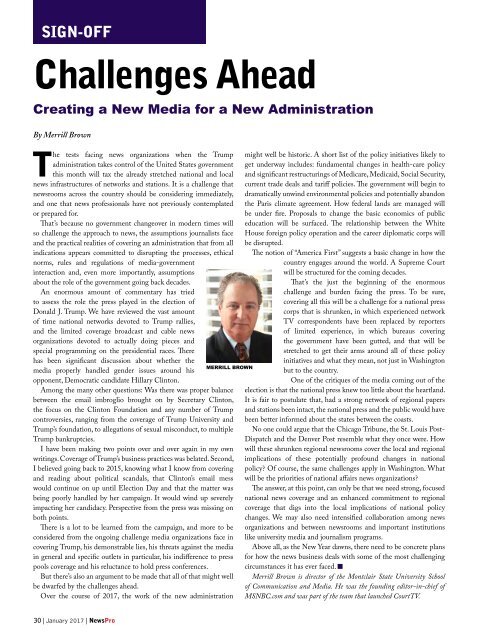12 to Watch
3rJZCvGpE
3rJZCvGpE
Create successful ePaper yourself
Turn your PDF publications into a flip-book with our unique Google optimized e-Paper software.
SIGN-OFF<br />
Challenges Ahead<br />
Creating a New Media for a New Administration<br />
By Merrill Brown<br />
The tests facing news organizations when the Trump<br />
administration takes control of the United States government<br />
this month will tax the already stretched national and local<br />
news infrastructures of networks and stations. It is a challenge that<br />
newsrooms across the country should be considering immediately,<br />
and one that news professionals have not previously contemplated<br />
or prepared for.<br />
That’s because no government changeover in modern times will<br />
so challenge the approach <strong>to</strong> news, the assumptions journalists face<br />
and the practical realities of covering an administration that from all<br />
indications appears committed <strong>to</strong> disrupting the processes, ethical<br />
norms, rules and regulations of media-government<br />
interaction and, even more importantly, assumptions<br />
about the role of the government going back decades.<br />
An enormous amount of commentary has tried<br />
<strong>to</strong> assess the role the press played in the election of<br />
Donald J. Trump. We have reviewed the vast amount<br />
of time national networks devoted <strong>to</strong> Trump rallies,<br />
and the limited coverage broadcast and cable news<br />
organizations devoted <strong>to</strong> actually doing pieces and<br />
special programming on the presidential races. There<br />
has been significant discussion about whether the<br />
media properly handled gender issues around his<br />
opponent, Democratic candidate Hillary Clin<strong>to</strong>n.<br />
Among the many other questions: Was there was proper balance<br />
between the email imbroglio brought on by Secretary Clin<strong>to</strong>n,<br />
the focus on the Clin<strong>to</strong>n Foundation and any number of Trump<br />
controversies, ranging from the coverage of Trump University and<br />
Trump’s foundation, <strong>to</strong> allegations of sexual misconduct, <strong>to</strong> multiple<br />
Trump bankruptcies.<br />
I have been making two points over and over again in my own<br />
writings. Coverage of Trump’s business practices was belated. Second,<br />
I believed going back <strong>to</strong> 2015, knowing what I know from covering<br />
and reading about political scandals, that Clin<strong>to</strong>n’s email mess<br />
would continue on up until Election Day and that the matter was<br />
being poorly handled by her campaign. It would wind up severely<br />
impacting her candidacy. Perspective from the press was missing on<br />
both points.<br />
There is a lot <strong>to</strong> be learned from the campaign, and more <strong>to</strong> be<br />
considered from the ongoing challenge media organizations face in<br />
covering Trump, his demonstrable lies, his threats against the media<br />
in general and specific outlets in particular, his indifference <strong>to</strong> press<br />
pools coverage and his reluctance <strong>to</strong> hold press conferences.<br />
But there’s also an argument <strong>to</strong> be made that all of that might well<br />
be dwarfed by the challenges ahead.<br />
Over the course of 2017, the work of the new administration<br />
Merrill Brown<br />
might well be his<strong>to</strong>ric. A short list of the policy initiatives likely <strong>to</strong><br />
get underway includes: fundamental changes in health-care policy<br />
and significant restructurings of Medicare, Medicaid, Social Security,<br />
current trade deals and tariff policies. The government will begin <strong>to</strong><br />
dramatically unwind environmental policies and potentially abandon<br />
the Paris climate agreement. How federal lands are managed will<br />
be under fire. Proposals <strong>to</strong> change the basic economics of public<br />
education will be surfaced. The relationship between the White<br />
House foreign policy operation and the career diplomatic corps will<br />
be disrupted.<br />
The notion of “America First” suggests a basic change in how the<br />
country engages around the world. A Supreme Court<br />
will be structured for the coming decades.<br />
That’s the just the beginning of the enormous<br />
challenge and burden facing the press. To be sure,<br />
covering all this will be a challenge for a national press<br />
corps that is shrunken, in which experienced network<br />
TV correspondents have been replaced by reporters<br />
of limited experience, in which bureaus covering<br />
the government have been gutted, and that will be<br />
stretched <strong>to</strong> get their arms around all of these policy<br />
initiatives and what they mean, not just in Washing<strong>to</strong>n<br />
but <strong>to</strong> the country.<br />
One of the critiques of the media coming out of the<br />
election is that the national press knew <strong>to</strong>o little about the heartland.<br />
It is fair <strong>to</strong> postulate that, had a strong network of regional papers<br />
and stations been intact, the national press and the public would have<br />
been better informed about the states between the coasts.<br />
No one could argue that the Chicago Tribune, the St. Louis Post-<br />
Dispatch and the Denver Post resemble what they once were. How<br />
will these shrunken regional newsrooms cover the local and regional<br />
implications of these potentially profound changes in national<br />
policy? Of course, the same challenges apply in Washing<strong>to</strong>n. What<br />
will be the priorities of national affairs news organizations?<br />
The answer, at this point, can only be that we need strong, focused<br />
national news coverage and an enhanced commitment <strong>to</strong> regional<br />
coverage that digs in<strong>to</strong> the local implications of national policy<br />
changes. We may also need intensified collaboration among news<br />
organizations and between newsrooms and important institutions<br />
like university media and journalism programs.<br />
Above all, as the New Year dawns, there need <strong>to</strong> be concrete plans<br />
for how the news business deals with some of the most challenging<br />
circumstances it has ever faced.<br />
Merrill Brown is direc<strong>to</strong>r of the Montclair State University School<br />
of Communication and Media. He was the founding edi<strong>to</strong>r-in-chief of<br />
MSNBC.com and was part of the team that launched CourtTV.<br />
30 | January 2017 | NewsPro


